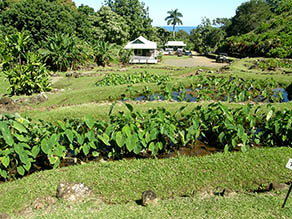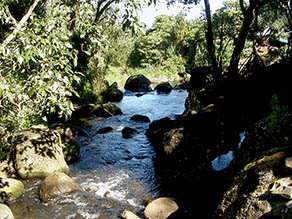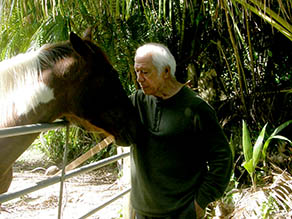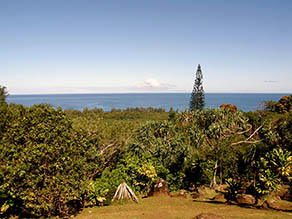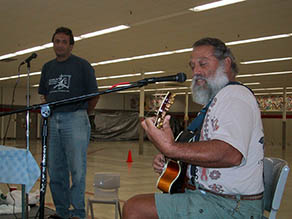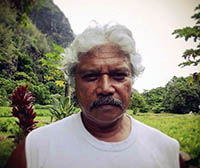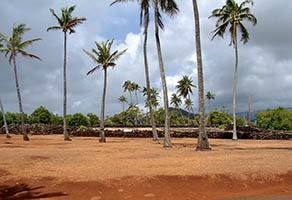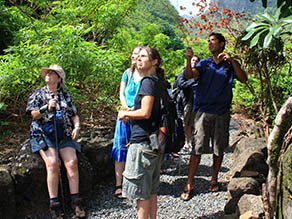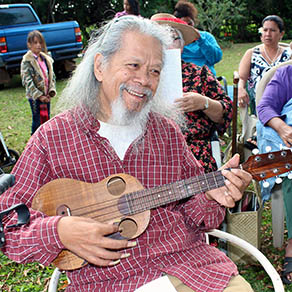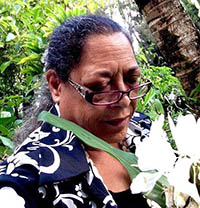 |
 |
 |
 |
||||||
|
|
|
|
|
|
|
|
|
|
 |
|
 |
|||||||||||
 |
A magnificent sunset off Hā‘ena. This concludes our journey through Hā‘ena—a journey through space and time. In departing, here are some closing thoughts from our Guides on what can be learned from the works of Hā‘ena's people, past and present: Chipper: “Because of the abundant resources that were available here in this ahupua‘a, and the fact that Hawaiian people were able to live here in harmony with them, and utilize them but not deplete or destroy them, this is one of those places that it believed to have been used all the way from early contact, all the way up continuously. A lot of places were used, and then abandoned. “If you walk up and look at those lo‘i, they have been used conservatively for 800 consecutive years, but how? The soil should be depleted! The key here is to mālama. If you can get into being inside of that ecosystem, from the Hawaiian perspective, be a part of it, you become part of that balance. And the problem I think we have with our society to day is, we don’t thing of ourselves as part of the ecosystem. We think of ourselves as above it. You know, this is ours to dominate or exploit. Then things get really out of balance that way.” Kelii: “Be involved with your culture. Never let go your culture—style of living, how you were brought up, instilled in you. Keep that going, because otherwise you’re looking at somebody else’s culture. And so you use to your way of growing up, what you had learned from your parents, and from your grandparents, and on and on. Think about that, that word ‘culture’ is the upbringing of you, of your blood. And again, it goes from the mountains to the sea—mauka to makai. What happens up mauka will effect makai, so you’ve got to work two ways. You got to take care up there, so nothing going come down here and humbug this. Going be a nice flow. So for me, that’s what I want to pass on, because again, that’s my culture, that’s my place down there. That’s where I am and I’m going to do everything in my hands that I can do for take care of that place.” Nalani: “The generations have changed so much that everybody is always looking to the store versus learning to gather or work hard to care for the land. The disconnection is really sad, it really is, because the kids, even though we raised them basically the way we were raised—gathering—once they become adults, everything is ‘I can go get them at the store.’ Okay, did you ever think about this: if the supply boat doesn’t come, what then? Our kids and our niece and nephew, I know they’ll survive. I know their families will survive. They’ve not lost that. But it’s getting that whole generation to pay more attention and really taking care, going and learning to do versus depending on going to the store. "Working in a taro field or in a garden, you’re always going to have a food source, and you know that you yourself planted it. You can go from garden to table. Take care of the land because it’s going to feed you, it’s going to come back, but you have to take care of that. And it’s no different with the ocean. With commercial fishing, everybody thought, ‘Oh, good way to make money, big money,’ without really realizing that if they don’t take care of their resources, they are not going to be there. And that’s the scary part. We all need to work together and take care of this, and it’s not about claiming ownership. Always remember that we were put here to be the stewards of the land. The only one person that owns it is Akua up there. But a lot of times the generation takes it in that fashion, ‘Our land.’ No, no, no! That’s not it. No. Ke Akua owns it. We are supposed to take care of it only. Hopefully, it will work its way through to where they will get how important it is, and live simple. If it wasn’t encouraged from kūpuna, then it’s going to be really hard.” Samson: “Gotta be in you. If it’s in you, it work. Unless, you can change the mind, eh? Then it’ll work. Otherwise only talk. So, they talking, if not in the people, then you gotta listen to them more so, you can surrender to that idea, eh? Cause if you never live like that, you cannot do that. "For a person that when they talking about it, they really never go through the mental process of making it so. For me, if going through the mental process and you accept that, then okay, then it will happen. But if you never go through the mill, then never going happen.” Makaala: “That the power of knowing who you are and where you belong and what your place is, is immeasurable. And the potential for what can be accomplished if you stay connected to the place. The people may come and go, the organizations may come and go, the institutions come and go, the agencies come and go, but the place is always there. And if you stay connected to the place, I know it’s a repeating song, but it’s the song I sing because it indeed has worked. You can accomplish whatever that place calls for. Whatever that place needs. So sometimes it’s being quiet and listening to where you are and being aware of where you are and who you are. And sometimes it’s being loud and being brave, and bucking the current. “And if you’re doing something true, you know it. And if you’re doing something correctly, you know it and you’ll be fine—the place will back you up, every single time. Sometimes it gives you a test here and there. Pretends to not care. But in the end it’s what it’s about, “Nobody, especially in this day and age, has the fortitude to take some of these challenges on by yourself. So don’t be afraid to partner, it’s not a bad thing. And you can compromise here and there, but you don’t have to give stuff up just because you’re a partner. Again, if the place is the focus, then all the partners behave in a better way too. It’s not about this agency being in charge, it’s about the place being in charge, and then guides you to help that. It gives everybody a different, a different motivation and a different focus. Indeed it’s what working in Hā‘ena, it’s what’s working in Kāne‘ohe. Carlos: “How can anything get done if people don’t help each other? I had a friend who is a very successful person and he said ‘Good business is like good music: everybody plays their part, then we have harmony. But if people don’t do their part, you can’t make good music.’ "So theoretically speaking, if we all work together—those that are in government and those that are on the land—we can really accomplish something. "But people are messy in the sense that they are not programable like machines. On the other hand, resources will often take care of themselves if one can restrain people from working contrary to the laws of nature. Right? If we can just pay heed and allow the ‘āina to lead us in the appropriate way.” Michael “The Hā‘ena rules are important, because a lot of things were lost. We need to come back again to what was. Understand, this is not a new way, it is an old way, going back to the way it should be. And not for me, really, but for the future, for my future grandkids and their kids. Mahalo nui loa.” Guy: “I just moved up here like three and a half years ago, and as you’re coming up—from Lydgate all the way up here to Poliahu—you pass a couple of heiau on the way. When I moved up here, the bushes were nine feet tall. Nobody was touching them, only the outside was nice but the inside was looking out of control. So I just started cleaning it by myself. "It took me about a year and a half to catch up to it, but now I can do it on my own and it takes me about a week now instead of a couple of months. I just do it in my in-between time. Like they say, there is a lot of work to be done and a lot of money to be made; but when there is no money to be made, there is still a lot of work to be done. "So when work slows down for me out in the field, then I just volunteer in the community because it makes it a lot nicer for us, for everybody when they drive by and they pass it. It’s a beautiful place—the walls can see each other and everything like that. “I’m like, ‘Well, it’s just giving back to the people, giving back to the community, giving back to myself really.’ Because I’m only on borrowed time, until this body is tired and old and done. And then our spirit lives on.” 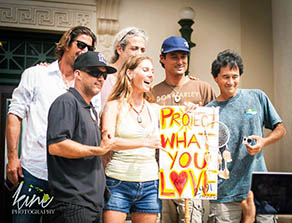
Donovan: “At the present, we are obligated to take the knowledge of our past and make the best out of what we have in the present in order that when we return what’s been loaned to us from the future, they will be able to have something that is pure and righteous—pono, pristine and clean. We as a society have gotten so far away from that belief that we’re here only because of the work that our kūpuna did, and that our time here is lent to us from our future. "There is a real connection in the Hawaiian mind frame, in the Hawaiian philosophy, that our existence here isn’t ours. Our existence here is because we have a kuleana to the future. And the only reason we are able to exist in this time is because the same kuleana that we have to our future was taken up by those who have lived in the past. And we’re here because of them, because they understood that we were going to be here after them and that their responsibility was to preserve what was pure, righteous, and pono in order for us to be pure, righteous and pono. “So ultimately that’s my hope and my dream: that we as a world, as a society, can begin to embrace the ideals and philosophies of indigenous cultures around the world and put them back where they belong: the foundation. And through that foundational thinking, we will restore the balance—what is pono in this world, the true balance between us as caretakers and this earth as provider.” Kawika: “In the context of Hawaii, Hā‘ena is one of the smallest ahupua‘a there is, and what we’re trying to do is to look at the practices and philosophies associated with ahupua‘a management in the ancient context, and apply that in the modern context—coupled with the best of modern science—and show how it is a viable strategy for living sustainably with our ‘āina. “Ahupua‘a doesn’t mean ‘watershed,’ but if you apply these concepts on a watershed level, you can apply them on continental systems. Chesapeake Bay, Mississippi, Mekong, Nile—all of these huge systems that evidence all of these complex problems, it’s the same problems that we have in a small ahupua‘a like this. It’s just a bigger scale. So how do you figure these things out and then scale it up and try to address the global sustainability? "To me, that’s the gift of our ancestors to the world: these lessons that are kind of veiled right now, but there are people like me who are trying to translate it to a broader audience so that our grandchildren’s grandchildren healthy and living off of ‘aina. “The role that we play here at Limahuli Gardens is to try to be a model of sustainability. And we try to be the translator of this ancestral wisdom to a larger audience, because it’s needed now. If we don’t translate this wisdom, and we don’t educate a broader audience about it, people aren’t going to change their ways, and we’re going to go down a bad road on this planet. So that’s the role that we play, and on a kind of a bigger context. In our own community, we’re trying really hard to be a facilitator for the perpetuation and the re-awakening of traditions and resource-management philosophies and strategies.” Uncle Nathan: “We’re unique. We are unto ourselves, because we are so separated by distance from everybody else. It has pride even until today. The people here are more protective of who and what we are. That’s how I feel. We have no choice because of our isolation; it’s to be protective, even of each other. They ’re not open right away, they step back and watch and observe. They’ll say ‘Oh yeah, Aloha!’ but they’re watching everything you do. You know, ‘No can.’ They were like that with me because I was not open to receiving. I was not ready to receive them yet. “You can be in touch with it there in this modern world. And our connection to our ‘āina, and to our ways, and to our people is vibrant. It’s living. It’s still alive. Hawaiians have gone through where people have abused what we've shared, so we're very cautious about who we share with.” Leilani: “Be kind please, be kind to each other. Kindness is a big thing, just be KIND. Know that what you’re experiencing now will change, and hopefully you’ll have a strong foundation of kindness, of respect and of compassion to carry with you through the decades in your life. We are fortunate to have a strong foundation and a continuing legacy in our Hawaiian culture—gifts from our ancestors—to help guide us. Because it’s going to change so dramatically. You’ll be sitting there and going ‘This is not the world I started out in, what is this?’ It’ll get quicker, it’ll get faster. Progress and technology is hitting more and more—use it for something good, but don’t let it take over that kindness and compassionate respect for each other. I see it going that way a lot right now and it’s painful to see, not just locally but globally on the technological and social end.”
|
 |
|

|
|
||||
| Copyright 2018 Pacific Worlds & Associates • Usage Policy • Webmaster |
||||

